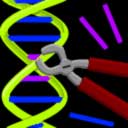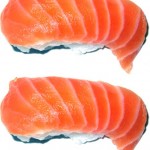
Genetic Modification
I was browsing around using my new, Stumbleupon.c0m account, and I found a very interesting webpage by NPR. This page was what appeared to be a mildly-interactive Flash movie of the Buddha’s wheel of Life. The wheel was intriguing but what really blew my mind and set me on a good track of thinking was the part on Humans. In this section the narrator, Robert Thurman discusses that Human form is a preferable form of existence because of several reasons. But what really stood out for me what that he said that humans have the ability to change their behavior and affect their genetic information. This line of thinking is slightly non-intuitive and intuitive at the same time. It is almost an extension of the old, “You are what you eat” kind of thinking, but it goes much further.
I first heard this type of hypothesis when I saw the movie, “What the Bleep Do we Know?” Now I know there are a lot of people who disagree with the things said in that movie and I’m not a quantum physicist (yet) so I’m not going to argue. But one thing in that movie that I read about in College Level biology was about how cells are controlled by the instructions in the genetic information. And different receptors on the cells and how many of them there are is worth study.
For example, there are receptors on cells for different chemicals. And different emotions that people experience trigger chemical responses in the organs and that can lead to chemicals being introduced into the blood stream. But if cells get used to receiving certain chemicals, they can adapt and they change and they may actually grow more receptors for that specific chemical. That’s where chemical dependency gets into the mix.
So this is where pleasure based habits are tricky. They don’t just affect how you feel, they affect how the cells grow also. But what my interpretation of the narrator’s words are in the video is that someone who is on the path of enlightenment can overtime confront their desires and addictions and modify his or her behavior. And by changing the behavior the cells produce different receptors, quite simply, because they aren’t being bombarded by the chemicals they are used to anymore. So the cells create new receptors for different life functions.
This is an important thing to think about, because there is only so much surface area on a human cell. So when it is covered in receptors that are focused on some sort of addictive habitual behavior, the cells are missing out on receptors that are useful for vital life functions. This may make one think for a second, when they say, “I’ve been feeling sluggish lately.”
Honestly, I’m just as skeptical of this mind-over-matter stuff myself. I love “Q” and “Adria” and all those guys but I think it is easy to get a few steps ahead of ourselves with wishful thinking.
All I know is what I can remember from what I’ve directly experienced. And I’ve directly experienced physical, emotional, and energy level changes. Unfortunately the positive changes usually came from sacrificing and extreme moderation. It really is not fun at first but there is definitely a trade-off.
Let’s take Venti Whole Milk Lattes for example. I used to love those. They would give me a burst of energy, I would blog like crazy with them. It was fun getting them and talking with the Baristas about current events or TV shows or whatever. The whole process was fun. But what would happen is that after having them almost every day, I would feel cloudy and muddled. And after a couple months I would get sick and need to de-tox from lattes.
What was happening is that, like usual, I would take a fun treat and turn it into a ritualistic habit. I have a real vulnerability for this. So what I think was going on, was that after a few months, my cells were reproducing with more receptors for the sugar in the milk…and more receptors for the caffeine from the espresso.
How is this possible? Well, I’m guessing that the cells don’t actually “GROW” new receptors. What I think happens is that the cell realizes that there is an abundance of caffeine floating around in the bloodstream, so it reprograms the Genetic Information so that when it splits up and reproduces, the new cells are created with more receptors to take advantage of the available abundant chemicals.
But the tough part is when I try to kick the latte habit, I feel even worse. This is because the cells hypothetically have many receptors and are trained to absorb the caffeine and sugar are perplexed by the change in blood chemistry. So they release information back to the brain of how the cells aren’t satisfied with the blood chemistry. And this gets interpreted by the brain as a craving.
The sad part is that cravings are actually essential parts of human experience. They aren’t good or bad, they are part of how humans survived when there were less abundant times. If you lived many hundreds of years ago, in a different society, you may crave salt, which is a neural transmitter. Because if you don’t get enough salt your brain and nerves have trouble functioning. But today salt is so abundant in most restaurant foods, we get overloaded and bloated.
But it is very difficult to combat these hard-wired cravings that have helped humanity survive trying times. But it is the struggle and eventual attainment of different tiers of self-behavioral modification that can lead to seriously positive things. And I think that is what the narrator in the video is touching on, albeit very briefly.
-Tyler


